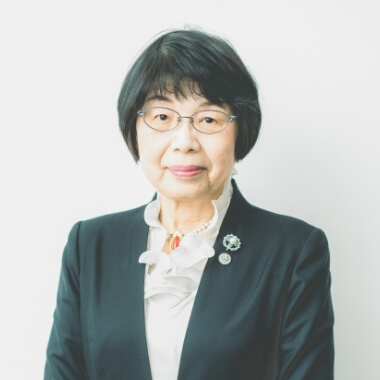Fully Committed to Realizing “Pioneering the Future of Wakayama through the Power of Nursing”!
My name is Nojiri, Dean of the Wakayama Faculty of Nursing. The Faculty of Nursing was established with the aim of training highly skilled nurses who will support regional medical care in Wakayama Prefecture.
So far, more than 95% of our students have been high school students from within the prefecture, and we have trained highly motivated and skilled nurses, public health nurses, midwives, and school nurses. The employment rate within the prefecture is an astonishingly high 90%.
As you know, the nursing profession is indispensable for community health and community medicine. In Wakayama Prefecture, where the birthrate is declining and the population is aging ahead of the rest of the country, the role of nurses and other professionals with advanced practical skills and close ties to the community is especially important in order to create a community where people can live with peace of mind in their own way, no matter where they live. It is no exaggeration to say that the future of Wakayama depends on the competence of the nursing profession.
Therefore, the faculty and staff will work as one to realize a future where students who study nursing are energetic, faculty members who teach nursing are energetic, and the people of the prefecture are energetic through the power of nursing.

Message from the vice
president/dean
Wakayama Faculty of Nursing
— born from the combined
determination of four stakeholders
“A university in Wakayama,” “a university located downtown,” “nursing education at a university level,” and “health care personnel for today’s needs” Wakayama Faculty of Nursing was born in April 2018 through the close bonds and collaboration between Wakayama Prefecture, Wakayama City, Japanese Red Cross Wakayama Medical Center, and Tokyo Healthcare University. As the population declines and ages, the faculty nurtures nurses who support the community so that people can live independently in a familiar place as long as possible. It also forms a nucleus for community support and cooperation in the field of medicine, health, and welfare and actively contributes to the society to promote coexistence with the community.
About THCU
Tokyo Healthcare University (THCU) is a medical and health university consisting of five faculties with seven divisions, a Department of Midwifery, and postgraduate schools . The number of students in nursing divisions across faculties is about 2,000, which makes it the largest in Japan. Since it was established, the university has produced many nurses in the field of medicine, and building on its success, it continues to nurture talents with the rich character and cultural knowledge that are needed today, who are able to tackle various social challenges from a new, comprehensive perspective.
Wakayama
- Wakayama Faculty of Nursing
- Wakayama Postgraduate School of Nursing
- Wakayama Department of Midwifery
Tokyo / Chiba
Faculties
- Faculty of Healthcare
- Higashigaoka Faculty of Nursing
- Tachikawa Faculty of Nursing
- Chiba Faculty of Nursing
Departments
- Department of Midwifery (Gotanda Campus)
- Postgraduate Schools
- Postgraduate School of Healthcare
- Postgraduate School of Nursing
- Chiba Postgraduate School of Nursing


Wakayama Faculty of Nursing
Available certifications
Qualifications for the national examination for nurses Expected career paths: hospitals, clinics, home-visit nursing stations, nursing universities and training schools, long-term care homes, various workplaces
Nurses support medical care and medical assistance for people suffering from illnesses, injuries, and disabilities. They observe and judge subjects with their own unique perspective, and support life and living. Their areas of work are quickly expanding from medical institutions such as hospitals and clinics to medical, health, and welfare institutions such as home-visit nursing stations and long-term care homes.
Qualifications for the national examination for public health nurses Expected career paths: prefectures, municipalities, public health centers, medical institutions, offices, and research institutions such as schools and universities
Public health nurses provide community health activities focused on disease prevention through home visits, health consultation, and health check-ups for people with various health conditions in the community. Their main area of work varies: public health centers, municipalities, health management for companies, health education in schools, and so on.
School nurses(Yogo Teacher)
Expected career paths: school nursing in elementary, middle, or high schools
School nurses mainly protect the health of children and students as “a school nurse” in kindergartens, elementary schools, middle schools, and high schools. They offer first aid for injuries and illnesses, check on physical growth and development, perform health check-ups, plan school-based health activities, understand students in their mental and physical aspects, and provide care for their health.
Sanitary supervisors
Expected career paths: various companies
Sanitary supervisors manage technical issues on sanitation within safety and sanitation at offices with at least 50 workers.They manage the work environment to prevent any health issues in workers.

Wakayama Postgraduate
School of Nursing
Advanced experts who can exhibit leadership
Learning nursing does not stop at the university; it is also progressing at graduate school. At our faculty, we have established Wakayama Postgraduate School of Nursing. Talents are being developed as medicine is advanced and specialized, and the areas where nursing can play an active role are expanding. Specifically, in Japan, comprehensive community care is being promoted, and it is said that “while nurturing talents that promote comprehensive community care overall, we should also nurture next-generation health and medical personnel, assuming cross-disciplinary cooperation between medicine and welfare.” At Wakayama Postgraduate School of Nursing, we hope to develop “human resources with advanced practical skills to involve the community and provide support for healthy lifestyles.” These professionals will be equipped with advanced practical skills, educational skills, management skills, and leadership, so that residents in the community can live their entire lives securely and as they wish.

Wakayama Department of
Midwifery
Nurturing midwives who will lead the next generation
In recent years, along with the diversification of the environment
surrounding mothers and children and the sophistication of perinatal care, there is a demand
for improved practical skills of midwives, and the regional uneven distribution of midwives
has become a problem. In Wakayama Prefecture, both globalization and localization are
progressing, and preparing for disasters is an urgent issue.
In anticipation of such a situation, the Wakayama Department of Midwifery has a mission to
support local perinatal care, contribute to the improvement of local maternal and child
health, and develop midwives who can create midwifery in response to the changing times.
